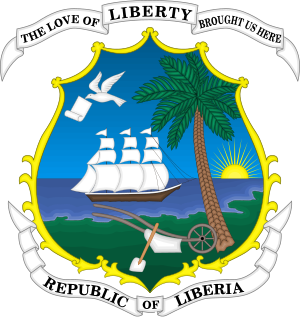 Image via Wikipedia
Image via WikipediaBy Gboko John Stewart
Nick (not his real name) who is a gay, sits with his legs cranked at an upscale restaurant in downtown Monrovia.
Getting him to have a chat on a subject that is considered a taboo in Africa was not an easy task. But he finally decided to let the cat out of the bag on the condition of strict anonymity.
Nick can be termed as a ‘closet gay’. Says Nick:
“I discovered my attraction for same sex when I was in the seventh grade in 1998. I didn’t become gay because I’m materialistic like the way others are for the love of money. I became gay because the feeling for the same sex is natural. I know it’s not easy for you to understand what I’m talking about - only those in my shoes know how it’s like. ”Nick, a graduate of the B.W. Harris Episcopal High School, holds a BBA degree in Accounting from the African Methodist Episcopal University (AMEU) and work at one of Liberia’s premiere banking institutions. Nick says he has to hide his sexuality in order to be accepted.
But unlike Nick who is gay because of an inborn tendency, Kollie (not his real name), who is from a poor background, says his came about because he needs money constantly and has to keep up with the Joneses.
“I’m not working. I use what I have to get what I want. My jewelries [gold] are example,” says Kollie as he looks around unevenly to see whether somebody is eavesdropping. Kollie says he sleeps many high ranking government officials and United Nations Staffs who themselves are secretly gay.
For many gay men in Africa, life is a constant struggle. Some men choose to hide their sexuality and are condemned to a life of secrecy. As a result, a significant number of African gay men are also married and in some cases have children.
Men who choose to live an open life or who are exposed as being gay are often subject to unrelenting stigma and discrimination to such an extent that they can be denied a normal life. This can have profound effects on their life and general health.
Attacks, random arrests, murder, and even the desecration of gay men after they have died have been reported across the African continent. Such an environment reinforces feelings of fear and insecurity among the gay community, which can prevent men who have sex with men from accessing HIV prevention, treatment and care services.
Over the last ten years there have been increasing reports of hostility towards gay men in Africa, with a particularly high number of incidences occurring throughout 2009 and 2010.
In 2009, Member of the Ugandan Parliament, David Bahati, tabled a draft bill in an attempt to punish same sex acts with the death penalty. Following this, there was a notable rise in homophobia throughout Uganda and other African countries, such as Kenya. Prior to the ‘Bahati Bill’ African gay men living in Mtwapa, Kenya had been able to live relatively openly. However, after the bill, community hostility and attacks upon gay men increased.
Another widely publicized incident took place in December 2009, when two men in Malawi were arrested after holding an engagement ceremony. The men were reportedly beaten and one was forced to undergo an anal examination as part of efforts to prove they had engaged in same-sex acts.
It is feared that a rise in hostility towards men who have sex with men will result in this group becoming harder to reach and unlikely to access sexual health services. And with the anti-gay resentment sweeping across Africa, people like Nick and Kollie are afraid to come out of the closet for fear of being ostracized.
“My brother, the first thing is how your family going to react when they find out that you’re on the other side of sexuality? One of my friends was disowned by his parents. You think I’m ready to lose my friends, relative and loved ones? OF COURSE NOT! Many of my friends working in the U.N. and other high places are in the same situations as I am,” says Nick.Nick reveals that the recent passage of the same sex legislation in New York, USA, thrilled him and he craves “for such historic moment to take place in Liberia.”
South Africa is the only country that is the only country in Africa that has passed the same sex legislation act. Last year, it was rumored that a bill of such was to be sent to the Legislature but it was soon met with criticisms from some prelates who called on the lawmakers to thrash anything that resembles it.
While being homosexual is not a serious crime in Liberia, it carries the charge of a misdemeanor. According to www.avert.org:
“Anti-gay laws often contradict the constitution of African countries and their commitment to human rights. Nevertheless, across the African continent a total of 36 countries out of 53 have laws, as shown below, which make homosexuality a criminal offence.
Laws differ markedly both between countries and within countries. Imprisonment is the most common punishment, the term of which can vary dramatically depending on the country or even region; for example from 10 days in Eritrea to a life sentence in Sierra Leone. Other punishments include the death penalty, flogging and imprisonment with hard labour or a fine.
The type of punishment and its severity is ruled in accordance with the details of an offence (e.g. public/private act, with a minor, against ‘the will’ of another person, a repeated act, whether the act involved actual intercourse or ‘gross indecency’).
In countries that do not have laws against homosexuality, social stigma and discrimination still occur and in some cases men who have sex with men are still subject to arrest for crimes such as vagrancy.”








 Join our page
Join our page


0 comments:
Post a Comment